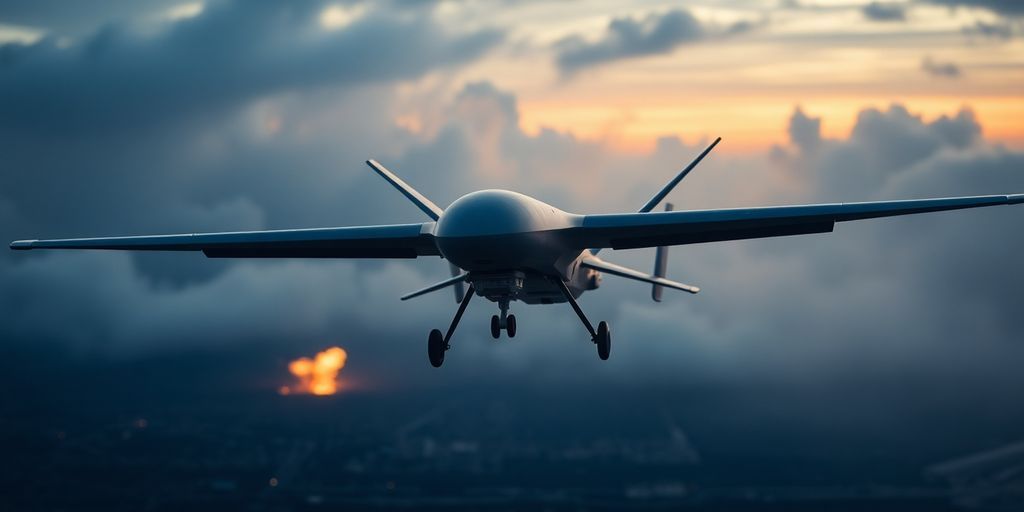On the outskirts of Fort Campbell, Kentucky, the U.S. military is intensifying its focus on drone warfare technology and training. As part of "Operation Lethal Eagle," the 101st Airborne Division is testing new tactics and equipment to better prepare for modern battlefield challenges, particularly in response to increasing drone threats from adversaries.
Key Takeaways
- The U.S. military is enhancing drone technology and training to adapt to modern warfare.
- "Operation Lethal Eagle" focuses on integrating drones into military operations.
- The training aims to improve soldier safety against drone attacks, particularly from Iran-backed militias.
- New drone systems, like the Black Hornet, are designed for ease of use by soldiers.
- Counter-drone technology is still in development, with challenges in effectively neutralizing threats.
The Rise of Drone Warfare
The integration of drones into military operations has become essential as they play a pivotal role in modern combat. Lt. Col. Reed Markham of the 101st Airborne Division emphasized the importance of drones in current military strategies, stating, "The drones are a part of the battlefield now." This shift reflects a broader trend in military tactics, where technology is increasingly leveraged to enhance operational effectiveness.
Operation Lethal Eagle
During the training exercise known as "Operation Lethal Eagle," soldiers are not only learning to operate drones but also assessing their effectiveness in various scenarios. The exercise aims to identify what works well and what needs improvement, ensuring that soldiers are better equipped for future conflicts.
- Training Focus Areas:
- Assessing new technologies and tactics.
- Enhancing soldier safety against drone threats.
- Developing intuitive drone systems for ease of use.
Addressing Drone Threats
Recent incidents, such as the deadly drone attack on U.S. service members in Jordan, highlight the urgent need for improved counter-drone strategies. The military is adapting its training to ensure that soldiers are aware of potential aerial threats and can respond effectively. Lt. Col. Markham noted the importance of maintaining vigilance against drone surveillance and attacks.
Innovative Drone Technology
One of the standout technologies being tested is the Black Hornet, a small, portable drone that soldiers can easily carry. This drone provides real-time reconnaissance capabilities, allowing operators to gather intelligence on enemy positions and movements. The simplicity of the Black Hornet means that even those without prior drone experience can operate it effectively.
- Key Features of the Black Hornet:
- Compact size, comparable to a small bird.
- Intuitive controls for easy operation.
- Capable of thermal imaging for enhanced visibility.
Counter-Drone Measures
As drone warfare evolves, so too must the strategies to counteract it. Experts suggest that the U.S. military is currently at a B-minus level in its ability to counter cheaper attack drones used by adversaries. The challenge lies in developing comprehensive systems that can detect and neutralize these threats quickly and effectively.
- Challenges in Counter-Drone Technology:
- Integrating multiple detection methods (radar, infrared, visual).
- Rapid response capabilities to neutralize threats.
- Developing cost-effective solutions to match the scale of drone threats.
Conclusion
The ongoing training at Fort Campbell underscores the U.S. military’s commitment to adapting to the changing landscape of warfare. By enhancing drone capabilities and developing countermeasures, the military aims to protect its personnel while maintaining operational effectiveness. As Lt. Col. Markham stated, the goal is not only to accomplish missions but also to safeguard the lives of those serving in the field.
Sources

Peyman Khosravani is a seasoned expert in blockchain, digital transformation, and emerging technologies, with a strong focus on innovation in finance, business, and marketing. With a robust background in blockchain and decentralized finance (DeFi), Peyman has successfully guided global organizations in refining digital strategies and optimizing data-driven decision-making. His work emphasizes leveraging technology for societal impact, focusing on fairness, justice, and transparency. A passionate advocate for the transformative power of digital tools, Peyman’s expertise spans across helping startups and established businesses navigate digital landscapes, drive growth, and stay ahead of industry trends. His insights into analytics and communication empower companies to effectively connect with customers and harness data to fuel their success in an ever-evolving digital world.












